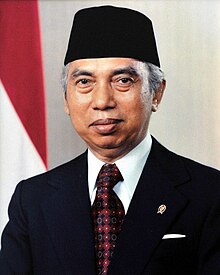
Back آدم مالك Arabic آدم مالك ARZ Adam Malik BAN Adam Malik BCL আদম মালিক Bengali/Bangla Adam Malik BTM Adam Malik Danish Adam Malik German Adam Malik Spanish آدم مالک Persian
Adam Malik | |
|---|---|
 Official portrait, 1978 | |
| 3rd Vice President of Indonesia | |
| In office 23 March 1978 – 11 March 1983 | |
| President | Suharto |
| Preceded by | Hamengkubuwono IX |
| Succeeded by | Umar Wirahadikusumah |
| 4th Speaker of the People's Consultative Assembly | |
| In office 1 October 1977 – 23 March 1978 | |
| Preceded by | Idham Chalid |
| Succeeded by | Daryatmo |
| 7th Speaker of the House of Representatives | |
| In office 1 October 1977 – 23 March 1978 | |
| Preceded by | Idham Chalid |
| Succeeded by | Daryatmo |
| 11th Minister of Foreign Affairs | |
| In office 28 March 1966 – 1 October 1977 | |
| President |
|
| Preceded by | Subandrio |
| Succeeded by | Mochtar Kusumaatmadja |
| 26th President of the United Nations General Assembly | |
| In office 1971–1972 | |
| Preceded by | Edvard Hambro |
| Succeeded by | Stanisław Trepczyński |
| Personal details | |
| Born | Adam Malik Batubara 22 July 1917 Pematangsiantar, Sumatra Oostkust, Dutch East Indies |
| Died | 5 September 1984 (aged 67) Bandung, Indonesia |
| Resting place | Kalibata Heroes' Cemetery |
| Political party | Golkar |
| Other political affiliations | |
| Spouse | |
| Occupation |
|
| Signature | |
| Military service | |
| Allegiance | Indonesia |
| Branch/service | Indonesian guerillas |
| Years of service | 1940s |
| Rank | Commandant |
| Battles/wars | |
Adam Malik Batubara (22 July 1917 – 5 September 1984) was an Indonesian politician, diplomat, and journalist, who served as the third vice president of Indonesia from 1978 until 1983, under President Suharto. Previously, he served in a number of diplomatic and governmental positions, including Speaker of the People's Consultative Assembly from 1977 to 1978, Speaker of the People's Representative Council from 1977 to 1978, Foreign Minister of Indonesia from 1966 until 1977, and president of the United Nations General Assembly from 1971 until 1972.
Born in Pematangsiantar, North Sumatra, on 22 July 1917. He grew up relatively comfortably, and was educated at the Hollandsch-Inlandsche School (HIS). He pioneered the establishment of the Antara news agency in 1937, and was an active supporter of Indonesian independence, being put in prison for disobeying the Colonial Government's ban on political assemblies. Towards independence on 17 August 1945, he was involved in the Rengasdengklok incident and the Proclamation of Independence. Following independence, he served in a number of government positions, including as a member of the People's Representative Council (DPR) and as the Minister for Trade. He continued to serve in government, following the fall of Sukarno. Being appointed Foreign Minister in 1966. In 1977, he was elected as Speaker of both the People's Representative Council (DPR) People's Consultative Assembly (MPR). In 1978, he was elected as the 3rd vice president of the Republic of Indonesia replacing Sri Sultan Hamengkubuwono IX who unexpectedly stated that he was not willing to be nominated again.
As vice president, he criticized the government for its increasing feudalism-like structure and rampant corruption, referring it as an "epidemic." In 1983, Malik's term as vice president came to an end and he was replaced by Umar Wirahadikusumah. Adam Malik died on 5 September 1984, in Bandung, due to liver cancer. His body was interred in the Kalibata Heroes' Cemetery. Later, his wife and children established the Adam Malik Museum. He was designated as a National Hero on 6 November 1998 based on Presidential Decree No. 107/TK/1998.